Agadir (in Arabic: أݣادير، أكادير) Morocco
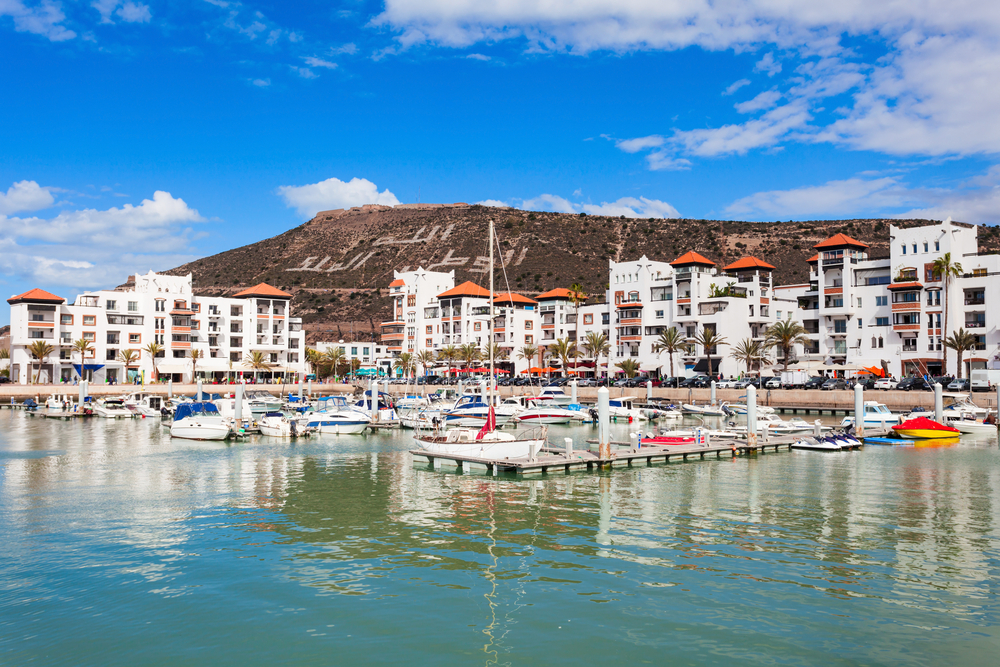
Agadir (Arabic: أݣادير، أكادير) is a significant city in Morocco, arranged on the shore of the Atlantic Ocean near the foot of the Atlas Mountains, just north of the point where the Sous River streams into the ocean. It is at a division of 508 km toward the south of Casablanca. It is the capital of the Agadir-Ida Ou Tanane Prefecture and of the Souss-Massa money related region. A prevailing piece of its tenants speak Shilha/Tashelhit, a Berber lingo of the Atlas branch, as their first vernacular.
Agadir City:
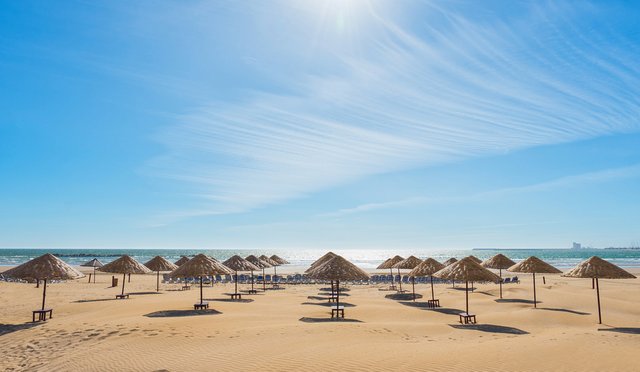
The city of Agadir together with the neighboring urban groups of Inezgane and Ait Melloul was assessed in 2013 to have 609,088 occupants.
As showed by the 2004 enrollment, there were 346,106 tenants in that year and the quantity of occupants in the Prefecture of Agadir-Ida Outanane was 487,954 occupants.
Agadir is regulated by Tariq Kabagge and it's one of the major urban concentrations of Morocco, the seventh-greatest conurbation of the country after Casablanca, Rabat, Fès, Marrakech, Meknes and Tangier. The masses thickness is high.
Three tongues are talked in the city: Tashelhit (first vernacular of the lion's offer), Moroccan Arabic, and French.
The city was crushed by a tremor in 1960, it has been completely redone with required seismic standards. It is as of now the greatest shoreline resort in Morocco, where remote tourists and various tenants are pulled in by an inquisitively smooth year-round climate.
Since 2010 it has been all around served by insignificant exertion flights and a motorway from Tangier. The city pulls in a wide range of various foundations; it has had a yearly improvement rate of over 6% consistently in cabin ask for while lodging era hardly outperforms 3.4%.
The delicate winter environment (January typical early evening temperature 20.5 °C/69 °F) and extraordinary shorelines have made it a significant "winter sun" objective for northern Europeans.
Agadir (in Arabic: أݣادير، أكادير) Historically :
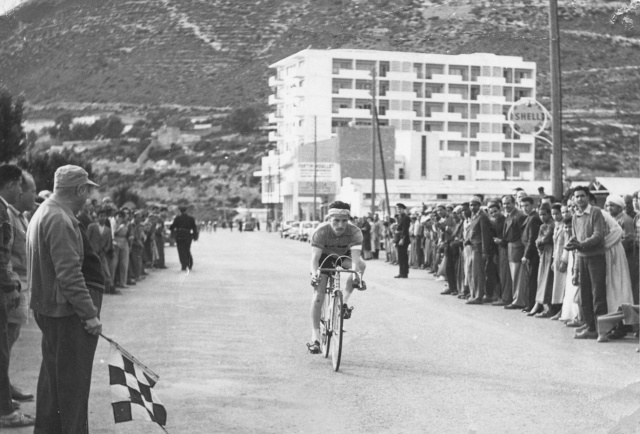
Little history is recorded on Agadir before the twelfth century.
In the second century AD, the curator Polybius implied North Africa on the Atlantic, a place called top Rhysaddir, that may have been arranged close Agadir yet its territory is still under open thought.
The most prepared cartographic say of Agadir is on a guide from 1325: at the gathered range of the present day city there implied that a place called Porto Mesegina, after the name of a Berber tribe starting at now determined in the twelfth century, the Mesguina, as it were the Ksima.
At the complete of the medieval period, Agadir was a town of some notoriety. The name itself, Agadir el-arba, was affirmed unprecedented for 1510.
In 1505, the Portuguese, who were by then presented on the Moroccan float, set up a trading post and a fortress at the foot of the incline to the sea, Santa Cruz do Cabo de Aguer on the site of the now-vanished neighborhood of Founti (named after the Portuguese word fonte meaning wellspring) under a delegate.
Quickly, the Portuguese were exhibited to the opposing vibe of the tribes of the area. From 1530, they were banned in Santa Cruz. Portuguese weakness showed itself on 12 March 1541 when Sherif Saâdien Mohammed searing remains Sheik got the stronghold of Santa Cruz de Aguer. Six hundred Portuguese survivors were taken prisoner, including the delegate, Guterre de Monroy, and his daughter, Dona Mecia. The detainees were recuperated by the holy men for the most part from Portugal. Dona Mecia, whose mate was killed in the midst of the battle, transformed into the spouse of Sheik Mohammed red hot remains Sheik yet kicked the can in labor in 1544. Around a similar time, Mohammed slag Sheik released the Governor Guterre de Monroy, whom he had moved toward becoming companions with.
The Portuguese having a place in Morocco, obtained in the region of 1505 and 1520, were backsliding. After the loss of Agadir, the Portuguese were obliged to betray Safi and Azemmour. Morocco was beginning to be less indispensable for Portugal which now swung to India and Brazil. After 1550, the Portuguese never again held anything in Morocco other than Mazagan (now El Jadida), Tangier and Ceuta.
The record of the Portuguese closeness (from the foundation in 1505 until the point when the moment that the fall on 12 March 1541) is depicted in unique duplicate (dispersed strikingly, with French understanding, by Pierre de Cenival in 1934) entitled "ESTE HE O ORIGEM E COMEÇO E CABO DA VILLA DE SANTA CRUZ DO CABO DE GUE D'AGOA DE NARBA", formed by secretive who was gotten in 12-III-34 and was five years inprisioned in Taroudannt (cf. "Santa Cruz do Cabo de Gue d'Agoa de Narba – Estudo e Crónica", Joao Marinho e Santos, José Manuel Azevedo e Silva e Mohammed Nadir,bilingual form, Viseu 2007).
In 1572, the Casbah was based over the slant by Moulay Abdallah al-Ghalib, successor to Mohammed ash Sheik. It was as of now called Agadir N'Ighir, really: fortified storehouse of the incline in Tachelhit.
In the seventeenth century, in the midst of the run of the Berber custom of Tazeroualt, Agadir was a harbor of some criticalness, developing its trade with Europe. There was, regardless, no honest to goodness port nor a wharf. Agadir traded generally in sugar, wax, copper, conceals and skins. Europeans took their created items, particularly weapons and materials. Under the lead of Sultan Moulay Ismail (1645–1727) and his successors, the trade with France, until the point that then a dynamic assistant backslid to the English and the Dutch.
The way of the Casbah
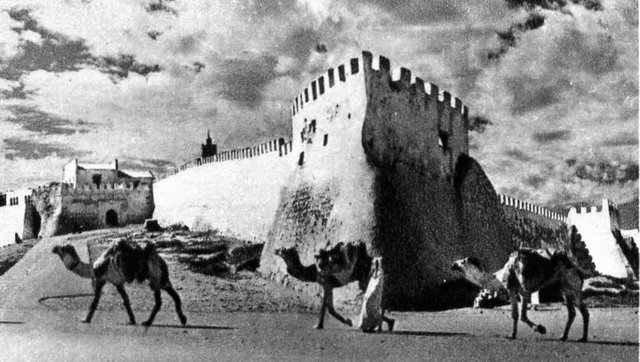
In 1731, the town was completely crushed by a seismic tremor. The harbor of Agadir was then asked for to be quiet when Essaouira was worked down more inaccessible north.
In 1746, the Dutch set up a trading post at the foot of the Casbah under the expert of the Sultan, and no ifs ands or buts appreciated the modifying of the city. Over the door of the Casbah, the Dutch etching can at give be seen its elucidation in Arabic: "Vreest God ende eert sanctum Kooning", which implies "Fear God and regard the King", and the date 1746.
After a long extend of progress in the midst of the tenets of the Saadian and Alawite organizations, Agadir declined from 1760 in light of the pre-refinement given to the battling port of Essaouira by the Alawite Sultan Mohammed ben Abdallah who expected to repel the Souss for restricting his energy. This reduction continued going a century and a half. In 1789, an European voyager gave a succinct depiction of Agadir: "It is presently a ghost town, there are near a few houses and these are breaking down into ruins".
In 1881, Sultan Moulay Hassan restored the harbor to trade demand to supply the attempts he orchestrated in the south. These attempts, which were to reassert his control over the Souss tribes and counter the plans of English and Spanish, were held in 1882 and 1886.
Guide of Agadir in 1885 by Jules Erckmann
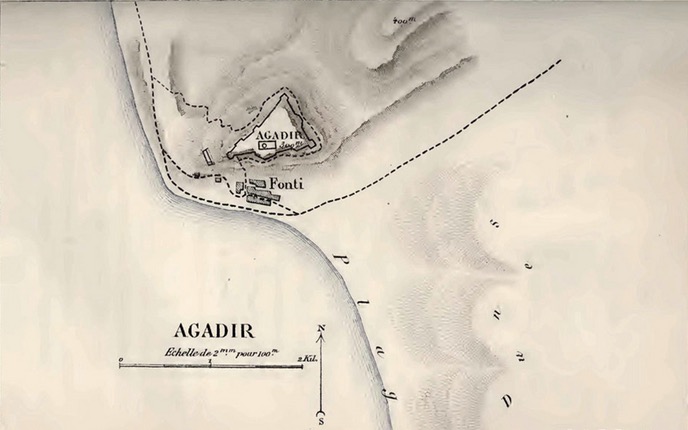
In 1884, Charles de Foucauld depicted in Reconnaissance au Maroc (Reconnaissance in Morocco) his quick area to Agadir from the east:
I walk around the shore to Agadir Irir. The road goes underneath the city, somewhere close to it and Founti: Founti is a miserable town, two or three fishers' cottages; Agadir, despite its white fenced in zone which gives it the attitude of a city is, I am told, a poor town expelled and without trade.
On the appearance of a call for help from German associations in the valley of the Souss, Germany settled on 1 July 1911, to expand its interests in Morocco and bear witness to a claim on the country. It sent to the Bay of Agadir, (which harbor was, until 1881, close to remote trade) the SMS Panther which was instantly joined by the cruiser Berlin. To a great degree strong worldwide reaction, particularly from Great Britain, surprised Germany and set off the Agadir Crisis among France and Germany. War undermined. After extraordinary courses of action, a Franco-German deal was finally set apart on 4 November 1911, giving a free hand to France, who may have the ability to develop its protectorate over Morocco as a final product of surrendering a couple of areas in Africa. It was at precisely that point that the gunboat Panther and the cruiser Berlin left the sound of Agadir.
Due to a blunder, the German arrangements assign Hermann Wilberg, who was sent to give the love to the intervention, simply arrived at Agadir three days after the Panther arrived.
In 1913, the urban groups (Agadir N'Ighir and Founti) totalled not as much as a thousand tenants. On 15 June 1913 French troops landed in Agadir. In 1916, the central dock was worked close Founti – a clear wharf, later known as the "Portuguese jetty", which remained until the complete of the twentieth century. After 1920, under the French protectorate, a port was created and the city saw its first headway with the improvement of the old Talborjt district arranged on the level at the foot of the slant. Following two years, beside Talborjt along the faultline of the conduit Tildi improvement of the pervasive region of Yahchech began.
Around 1930, Agadir was a basic stop for the French airmail advantage Aéropostale and was frequented by Saint-Exupéry and Mermoz.
In the years from 1930, a progressed central city began to be worked by the plans of the urban coordinator Henri Prost, official of the Urban Planning Department of the Protectorate, and his operator Albert Laprade: a horseshoe arrange in light of the waterfront[13] around a broad street inverse to the waterfront – the Avenue Lyautey, since renamed Avenue du Général Kettani. In the 1950s, urban progression continued under the heading of the Director of Urban Planning Morocco, Michel Ecochard.
After 1950 and the opening of the new plug port, the city developed with angling, canning, agribusiness, and mining. It likewise started to open up to tourism because of its atmosphere and wonderful lodgings. Quite a long while later from 1950 to 1956 Agadir composed the Grand Prix of Agadir and, from 1954 to 1956, the Moroccan Grand Prix.
In 1959, the port was gone by the yacht of the Greek transportation head honcho Aristotle Onassis and his visitor, Winston Churchill.
By 1960, Agadir numbered more than 40,000 inhabitants when at 15 minutes to midnight on 29 February 1960, it was again completely wrecked by a seismic tremor of extent 5.7 on the Richter scale that kept going 15 seconds, covering the city and killing more than 33% of the populace. The loss of life was evaluated at 15,000. The seismic tremor pulverized the antiquated Casbah.
On observing the devastation in Agadir, King Muhammad V of Morocco announced: "If Destiny chose the demolition of Agadir, its revamping relies upon our Faith and Will."
Agadir after 1960

The present city was revamped 2 km promote south, drove by the engineers Jean-François Zevaco, Elijah Azagury, Pierre Coldefy, and Claude Verdugo. Agadir turned into a vast city of over a large portion of a million by 2004, with a huge port with four bowls: the business port with draft of 17 meters, triangle angling, angling port, and a delight pontoon port with marina. Agadir was the head sardine port on the planet in the 1980s and has a renowned shoreline extending more than 10 km with one of the finest seafront promenades on the planet. Its atmosphere has 340 days of daylight for each year which takes into account swimming lasting through the year. The winter is abnormally warm and summer warm is never onerous (summer fog however is normal).
With Marrakech, Agadir is an imperative place for tourism to Morocco, and the city is the most vital angling port in the nation. Business is additionally blasting with the fare of citrus leafy foods created in the fruitful valley of Souss.
With its white structures, wide blossomed lanes, present day lodgings and European style bistros, Agadir is not a run of the mill city of customary Morocco but rather it is a cutting edge, dynamic and dynamic city, turned towards what's to come.
The straight of Agadir and the adjacent Bay of Taghazout are individuals from the "Club of the most lovely bayous on the planet".
The city is served by the Agadir–Al Massira International Airport.
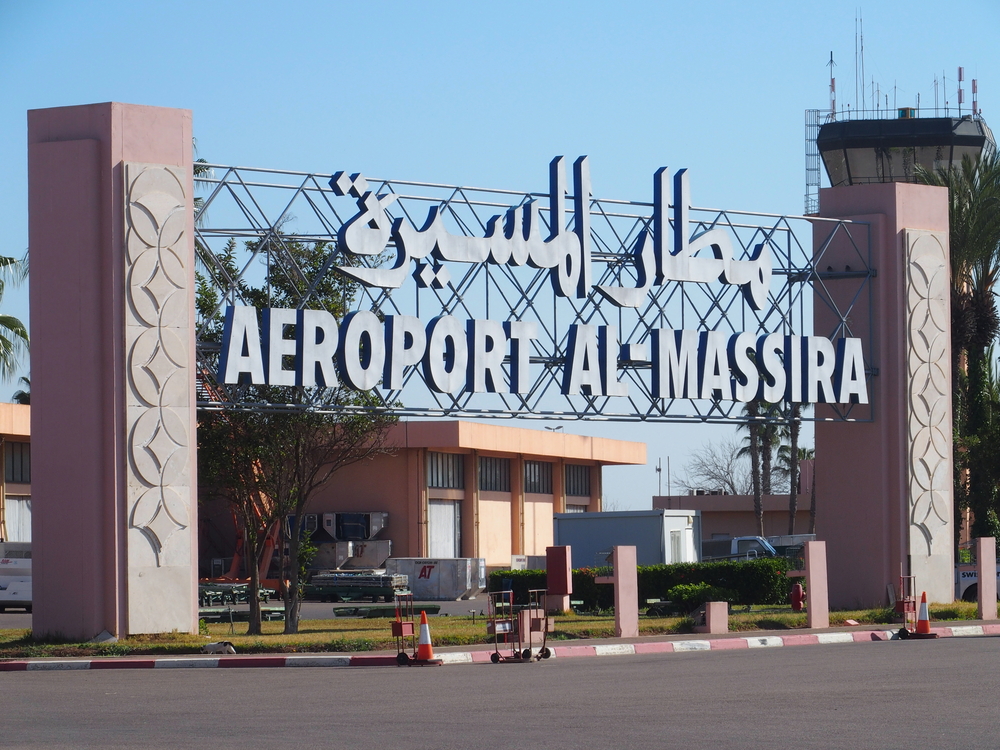
Agadir Weather and Climate
Agadir highlights a subtropical-semiarid atmosphere (Köppen: BSh ) with warm summers and gentle winters. Situated along the Atlantic Ocean, Agadir has an exceptionally mild atmosphere. The daytime temperature for the most part remains in the 20s °C (70s °F) consistently, with the winter highs ordinarily achieving 20.4 °C or 68.7 °F in December and January. The yearly temperatures are fundamentally the same as Nairobi, Kenya, yet with considerably less precipitation – around 290 millimeters or 11.4 inches every year – while mid-year evenings are less cold than the Kenyan capital.
Precipitation is altogether kept to the winter months and is vigorously impacted by the NAO, with negative NAO files delivering wet winters and positive NAO corresponding with dry spell. For example, in the wettest month on record of December 1963, as much as 314.7 millimeters or 12.39 inches fell, though in the positive NAO year from July 1960 to June 1961 a negligible 46.7 millimeters or 1.84 inches happened over the a year. The wettest year has been from July 1955 to June 1956 with 455.5 millimeters or 17.93 inches.

Once in a while be that as it may, the district encounters winds from the Sahara called Chergui, which may extraordinarily and for two to five days raise the warmth over 40 °C or 104 °F.
The least temperature recorded in Agadir was −2.6 °C or 27.3 °F and the most elevated greatest recorded was 49.1 °C or 120.4 °F at Agadir airplane terminal on 30 July 2009 [not in reference given]
In 1950, a blurb from the Navigation Company Pacquet announced: "Winter or summer, I bathe in Agadir"
Hi @agadir, welcome to steemit. Greetings know, happy to get acquainted with you. I ucin a photographer, if you like about wedding photos you can stop by my account called @ non-block. Thank you nice to meet you.
Thanks ucin for passing by
Welcome to Steem @agadir I have upvoted and sent you a tip
Thanks @bottymcbotface for your upvote, thanks for tip
Welcome to steemit, and thanks for this post, Upvoted done
Thanks for your comments, Greeting from Morocco! 🇲🇦
Welcome to Steemit @agadir, I have upvoted and sent you a tip. Check my blogs if you are looking for tips on how to earn more Steem and SBD.
Thanks @earncrypto for your comments and your upvote, i will check out your blog for sure
Excelent post! Regards from Argentina! 😄👍🏻🇦🇷
Thanks my dear @kryptoland ! Regards from Morocco! 🇲🇦
Welcome to Steemit! It's good time to start create Steemit better :)
True, thats why i have joined
This post has received a 0.63 % upvote from @drotto thanks to: @earncrypto.
Thanks @drotto @earncrypto @bottymcbotface for showing the love by sending some tips, i appreciate it
welcome to the Steemit Community, Agadir! Wish you much luck! Cheers! Follow me .
Thanks khunpoom for your comments
Congratulations @agadir! You have completed some achievement on Steemit and have been rewarded with new badge(s) :
Click on any badge to view your own Board of Honor on SteemitBoard.
For more information about SteemitBoard, click here
If you no longer want to receive notifications, reply to this comment with the word
STOPNice! You have signed up recently so I wanted to personally welcome you. You get an upvote and we're all waiting to hear more from you!
I know how hard it is as a fresh account so you could give Steemfollower a go. This exchange lets you earn up to 5x more steem than just upvoting by yourself! It's a simple and safe vote exchange that is free to use. I have more info on it in this post where I go over the system in more depth and, believe it or not, this has become my most upvoted post yet.